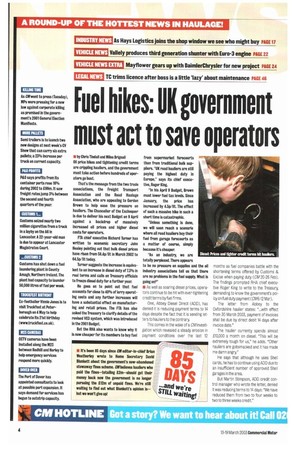Fuel hikes: UK government must act to save operators
Page 4

If you've noticed an error in this article please click here to report it so we can fix it.
w by Chris Tindall and Miles Brignall
Oil price hikes and tightening credit terms are crippling hauliers, and the government must take action before hundreds of operators go bust.
That's the message from the two trade associations, the Freight Transport Association and the Road Haulage Association, who are appealing to Gordon Brown to help ease the pressure on hauliers. The Chancellor of the Exchequer is due to deliver his next Budget on 9 April against a backdrop of massively increased oil prices and higher diesel costs for operators.
FTA chief executive Richard Turner has written to economic secretary John Healey pointing out that bulk diesel prices have risen from 58.4p/lit in March 2002 to 64.5p'lit today.
Turner suggests the increase is equivalent to an increase in diesel duty of 7.3% In real terms and calls on Treasury officials to freeze diesel duty for a further year.
He goes on to point out that fuel accounts for close to 40% of lorry operating costs and any further increases will have a substantial effect on manufacturing and retail prices. The FTA has also asked the Treasury to clarify details of the revised VED system, which was Introduced in the 2001 Budget.
But the RHA also wants to know why it is now cheaper for its members to buy fuel from supermarket forecourts than from traditional bulk suppliers. "UK road hauliers are still paying the highest duty in Europe," says its chief executive, Roger King.
"In his April 9 Budget, Brown must lower fuel tax levels. Since January, the price has increased by 4.5p/lit. The effect of such a massive hike in such a short time Is catastrophic.
'Unless something is done, we will soon reach a scenario where all road hauliers buy their fuel from garage forecourts as a matter of course, simply because it's cheaper "As an Industry, we are totally perplexed. There appears to be no pressure on supplies and the oil Industry associations tell us that there are no problems in the fuel supply. What is going on?"
As well as soaring diesel prices, operators continue to be hit with ever-tightening credit terms by fuel firms.
One, Abbey Diesel Direct (ADD), has denied it is reducing payment terms to 14 days despite the fact that it is sending letters to hauliers to the contrary.
This comes in the wake of a CM investigation which revealed a steady erosion in payment conditions over the last 12 months as fuel companies battle with the shortening terms offered by Customs & Excise when paying duty (CM 20-26 Feb). The findings prompted RHA chief executive Roger King to write to the Treasury, demanding to know the government's policy on fuel duty payment ( CM6-12 Mar).
The letter from Abbey to the Oxfordshire haulier states: "...with effect from 30 March 2003, payment of invoices shall be due by direct debit 14 days after invoice date."
The haulier currently spends almost £10,000 a month on diesel. "This will be extremely tough for us," he adds. "Other hauliers are gobsmacked and it has made me damn angry."
He says that although he uses Shell cards, he has to continue using ADD due to an insufficient number of approved Shell garages in the area.
But Martin Stimpson, ADD credit control manager who wrote the letter, denied it was reducing terms to 14 days: "We have reduced them from two to four weeks to two to three weeks credit."
































































































































































































































